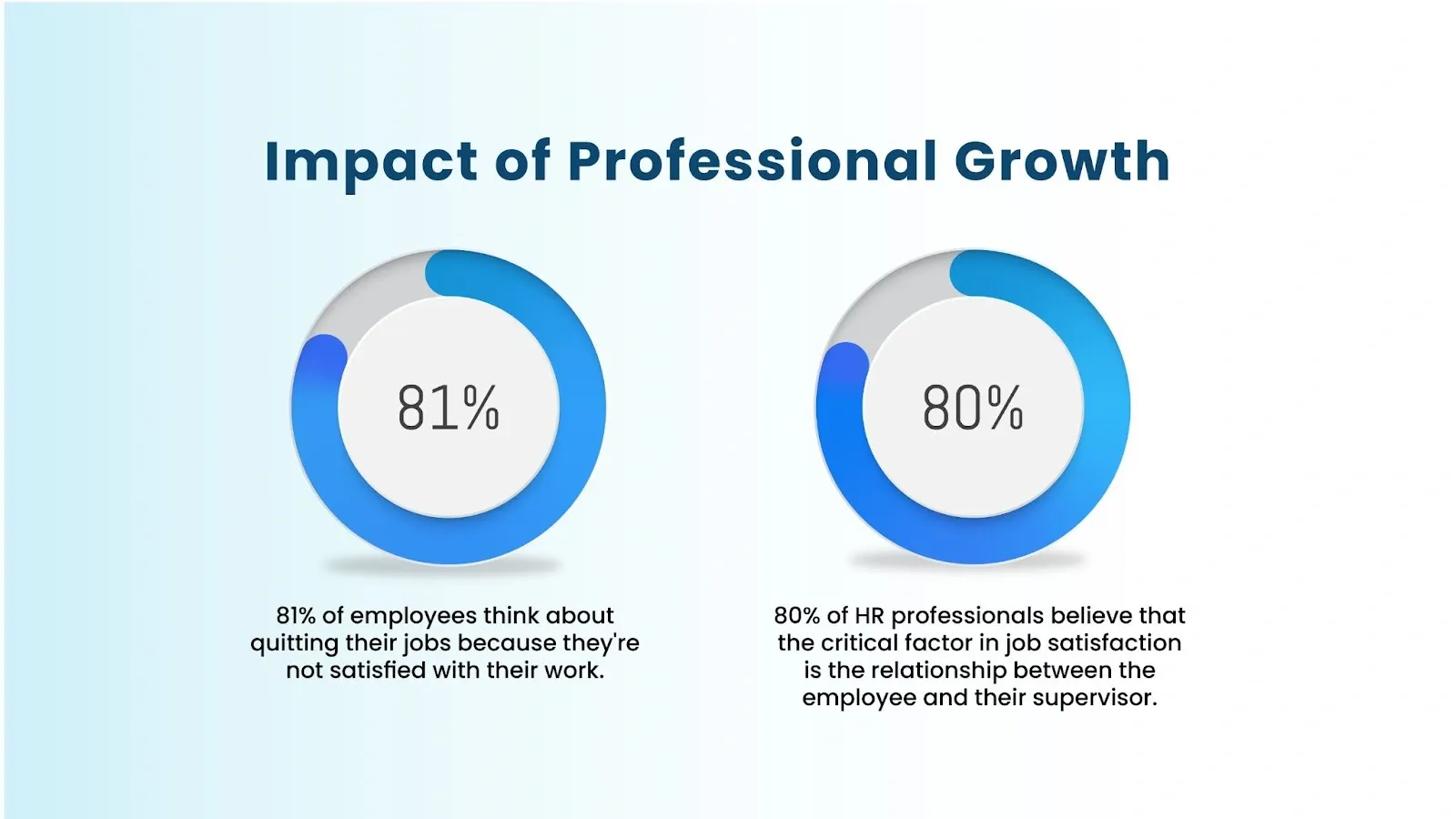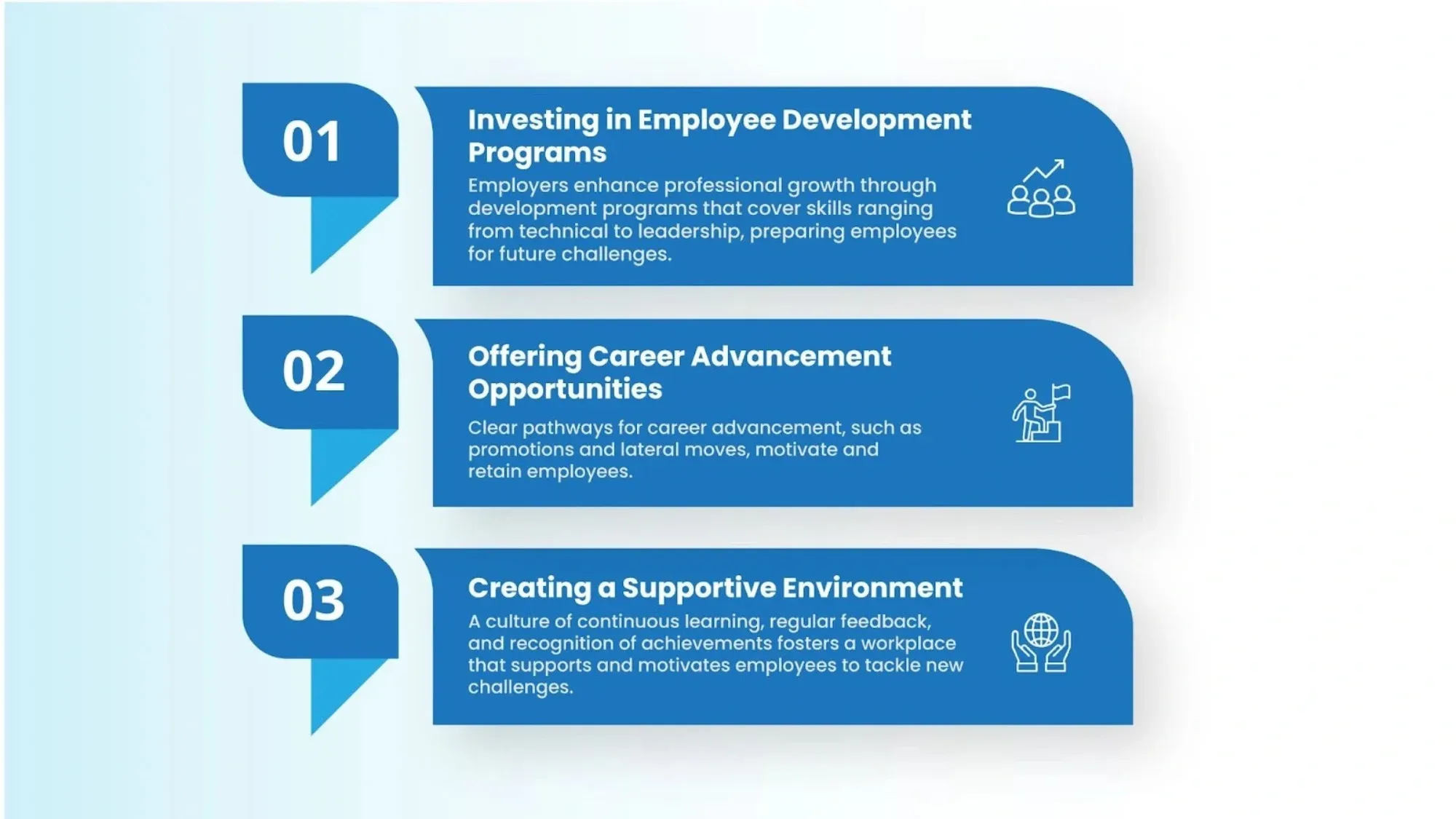Maximizing Success: Key Strategies for Promoting Professional Growth

What is professional growth for you? A comfort zone in your career or high LPA?
Well, none of these can be considered when determining your professional growth. It is a continuous process where your skills and knowledge are enhanced to excel in your current role and prepare for future career opportunities. It's crucial in career development as it keeps you relevant in a rapidly evolving job market and opens doors to new career opportunities.
The workforce is constantly changing, and keeping up with these changes is more important than ever! As technology evolves and new trends emerge, continuous learning becomes crucial for professional growth.

Let’s see what people say:
- 81% of employees think about quitting their jobs because they're not satisfied with their work.
- 80% of HR professionals believe that the critical factor in job satisfaction is the relationship between the employee and their supervisor.
The majority of employees and HRs believe that job satisfaction is paramount. Investing in professional growth is essential to prevent this dissatisfaction. By continuously learning, acquiring new skills, and taking on challenging projects, employees can find greater satisfaction in their work.
This not only benefits their personal career trajectory but also contributes to the overall success and productivity of the organization. In short, professional growth is a win-win for both employees and employers, leading to a more motivated, engaged, and satisfied workforce.
In this blog, we are going to understand how professional growth within an organization helps employees and employers with some practical strategies to promote professional growth.
Understanding Professional Growth
Professional growth refers to the continuous development of skills, knowledge, and competencies that enhance an individual's ability to perform in their current role and prepare for future career advancements. It involves a combination of formal education, on-the-job training, and personal development activities aimed at improving job performance and increasing employability.
Key components of professional growth:
- Skill Development: Acquiring new skills or enhancing existing ones through training, workshops, or self-study.
- Knowledge Expansion: Gaining deeper insights into industry trends, best practices, and emerging technologies.
- Networking: Building professional networks that provide opportunities for mentorship, collaboration, and career advancement.
- Goal Setting: Establishing clear career objectives and creating a roadmap for achieving them.
- Feedback and Reflection: Regularly assess performance, seek constructive feedback, and reflect on experiences to identify areas for improvement.
Often, people misunderstand professional growth as career advancement and vice versa. Though they are similar in characteristics, there is a significant difference between them.
Professional growth involves the continual development of skills and knowledge within a profession. At the same time, career advancement relates to progression within an organization or career path. The former focuses on personal skill enhancement, while the latter involves moving up or laterally in terms of responsibilities, positions, and compensation.
Both are integral to a successful professional journey, with professional growth laying the groundwork for career advancement opportunities.
Importance of Professional Growth
The importance of professional growth within an organization cannot be overstated, as it plays a crucial role in several key areas:
- Job Satisfaction and Employee Engagement: Professional growth is directly linked to increased job satisfaction and higher levels of employee engagement. When employees feel that they are growing and developing in their roles, they are more likely to be motivated, committed, and invested in their work, leading to better performance and productivity.
- Dynamic Job Market: The importance of professional growth extends to keeping up with the ever-evolving job market. As industries and technologies advance, employees need to continuously update their skills and knowledge to remain competitive and effective in their roles. This ongoing learning ensures that both the individual and the organization stay relevant and adaptable.
- New Opportunities and Career Paths: Professional growth often leads to the discovery of new opportunities and career paths within the organization. By developing new skills and taking on challenges, employees can unlock potential career advancements and explore different roles that align with their evolving interests and abilities.
- Personal Fulfillment and Self-Confidence: Beyond the professional realm, growth and development contribute significantly to personal fulfillment and self-confidence. As employees achieve their goals and expand their capabilities, they experience a sense of accomplishment and increased confidence in their abilities, which can positively impact all areas of their lives.
How Employers Can Facilitate Professional Growth

Employers play a crucial role in facilitating professional growth, especially for frontline employees. Here are some ways they can support and encourage this development:
- Investing in Employee Development Programs: Employers can facilitate professional growth by investing in comprehensive employee development programs. These programs should cater to various aspects of growth, including technical skills, soft skills, leadership abilities, and industry-specific knowledge. By providing structured learning opportunities, employers can help employees enhance their competencies and prepare for future challenges.
- Offering Career Advancement Opportunities: To encourage professional growth, employers should create clear pathways for career advancement. This can include promotions, role expansions, or lateral moves that allow employees to explore different areas of the organization. Providing these opportunities not only motivates employees to grow but also helps retain top talent within the company.
- Creating a Supportive Environment: A culture that values growth and innovation is essential for fostering professional development. Employers should encourage a mindset of continuous learning, provide regular feedback, and recognize achievements. By creating an environment where employees feel supported and motivated to take on new challenges, employers can enhance both individual and organizational growth.
Strategies for Promoting Professional Growth within the Organization
Promoting professional growth within an organization is crucial for employee engagement, retention, and overall success. Here are some strategies to foster professional growth, with a focus on frontline professional growth:
- Clear Career Paths: Establish transparent career paths that outline the steps and skills needed for advancement. This clarity empowers employees to take charge of their professional growth by understanding the opportunities available to them.
- Training and Development Opportunities: Offer a variety of training and development programs tailored to different roles and career stages. These opportunities should enhance both technical and soft skills, supporting well-rounded professional growth.
- Mentorship Programs: Pair employees with experienced mentors who can provide guidance, support, and insights into their professional journey. Mentorship is a powerful tool for fostering frontline professional growth and building strong relationships within the organization.
- Learning Culture: Cultivate a culture that values continuous learning and encourages employees to seek out new knowledge and skills. This can be achieved by providing access to online courses, workshops, and industry conferences.
- Professional Networking: Encourage employees to build professional networks both inside and outside the organization. Networking can lead to new opportunities, collaborations, and a broader perspective on their industry.
- Constructive Feedback: Regularly provide employees with constructive feedback on their performance and areas for improvement. This feedback should be specific, actionable, and delivered in a supportive manner to facilitate professional growth.
- Recognition and Rewards: Acknowledge and reward employees for their achievements and contributions. Recognition can take many forms, from verbal praise to formal awards, and it plays a crucial role in motivating employees to continue their professional growth.
- Job Rotation and Cross-training: Offer opportunities for employees to rotate between different roles or departments and cross-train in various skills. This exposes them to new challenges and perspectives, fostering a more well-rounded professional growth.
- Using Online Tools: Leverage digital tools like getCREDIBLE to track and showcase professional achievements, skills, and certifications. This can help employees build a comprehensive portfolio of their professional growth and accomplishments.
Introducing getCREDIBLE
getCREDIBLE is transforming professional branding through its innovative digital resumes. The highlight of this platform is the 'Slate,' a dynamic document that grows with your career, ensuring your profile remains up-to-date and highlights your abilities. Notable features include:
- Instant updates.
- AI-powered summaries of significant accomplishments.
- A feedback system for ongoing improvement.
- A user-friendly interface to craft an engaging professional story.
Conclusion
Focusing on professional growth within an organization is essential for creating a positive impression on managers and communicating your career ambitions. It allows them to see if your objectives match the expectations of your role.
Tools like getCREDIBLE are instrumental in highlighting your professional growth, skills, and accomplishments to your superiors.
Register with getCREDIBLE today to take advantage of its cutting-edge features, ensuring your professional growth is showcased effectively for a lasting im
